By Beau Mullen · Tuesday, January 20, 2015 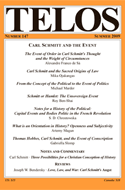 Central to Carl Schmitt’s geophilosophy is his view that law is intrinsically linked to the physical location. This connection between the terra firma and the law is an essential element of what he refers to as nomos. Schmitt sees this as the most authentic form of law, distinguishable from views that perceive law as a normative or positive regime. In his article “Carl Schmitt and the Sacred Origins of Law,” Mika Ojakangas elucidates Schmitt’s conception of nomos, its relation to Schmitt’s view of mythopolitical legitimization of the state, and the consequences of rejecting the notion of such a link by secularization. Central to Carl Schmitt’s geophilosophy is his view that law is intrinsically linked to the physical location. This connection between the terra firma and the law is an essential element of what he refers to as nomos. Schmitt sees this as the most authentic form of law, distinguishable from views that perceive law as a normative or positive regime. In his article “Carl Schmitt and the Sacred Origins of Law,” Mika Ojakangas elucidates Schmitt’s conception of nomos, its relation to Schmitt’s view of mythopolitical legitimization of the state, and the consequences of rejecting the notion of such a link by secularization.
Continue reading →
By Joseph van der Naald · Wednesday, December 3, 2014 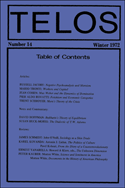 Mario Tronti’s postscript to the second edition of his publication Operai e Capitale, published in Telos in 1972 as “Workers and Capital,” provides the reader with a summation of his thought on the development of the “mass worker,” presented through an analysis of notable labor struggles across the Western world. Tronti’s methodology, which he briefly explicates at the beginning of the piece, delineates certain historical workers’ struggles in order to examine “macroscopic groups of facts yet untouched by the critical consciousness of labor thought” (25). His purpose is to yield “an historical model, a privileged period of research” (25) so as to better analyze the emergence of the autonomy of the working class engaged in a dialectical struggle with capital. Mario Tronti’s postscript to the second edition of his publication Operai e Capitale, published in Telos in 1972 as “Workers and Capital,” provides the reader with a summation of his thought on the development of the “mass worker,” presented through an analysis of notable labor struggles across the Western world. Tronti’s methodology, which he briefly explicates at the beginning of the piece, delineates certain historical workers’ struggles in order to examine “macroscopic groups of facts yet untouched by the critical consciousness of labor thought” (25). His purpose is to yield “an historical model, a privileged period of research” (25) so as to better analyze the emergence of the autonomy of the working class engaged in a dialectical struggle with capital.
Continue reading →
By Lukas Szrot · Tuesday, November 25, 2014 As Popper has written in several articles and his autobiography, he encountered Marxism as a young man in Austria around 1919. For two or three months he called himself a communist, but soon turned against the doctrine after the deaths of pro-communist demonstrators was justified with what Popper considered pseudo-scientific jargon. These events made him a fallibilist acutely aware of the distinction between dogmatic and critical thinking. (34)
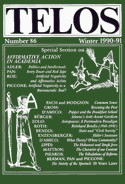 This emotionally powerful and philosophically significant experience colored Popper’s views of Marxism, the call for revolutionary social change, and the utopianism that foments it. In light of this, it is not difficult to see why Popper and (in particular early) Critical Theorists might have found much about which to disagree. Robert D’Amico discusses myriad points of contrast between Karl Popper and the Frankfurt School, though from the outset he acknowledges that the “infamous ‘methodology dispute’ in German sociology that occurred primarily between Popper and Adorno . . . is best described as a misfire” (33). Despite this alleged “misfire,” D’Amico’s analysis raises profound questions that continue to gain attention and prod ongoing debate in terms of the philosophy, theory, and methodology of the social sciences. This emotionally powerful and philosophically significant experience colored Popper’s views of Marxism, the call for revolutionary social change, and the utopianism that foments it. In light of this, it is not difficult to see why Popper and (in particular early) Critical Theorists might have found much about which to disagree. Robert D’Amico discusses myriad points of contrast between Karl Popper and the Frankfurt School, though from the outset he acknowledges that the “infamous ‘methodology dispute’ in German sociology that occurred primarily between Popper and Adorno . . . is best described as a misfire” (33). Despite this alleged “misfire,” D’Amico’s analysis raises profound questions that continue to gain attention and prod ongoing debate in terms of the philosophy, theory, and methodology of the social sciences.
Continue reading →
By Joseph van der Naald · Tuesday, November 18, 2014 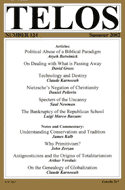 Is humanity’s need to control nature ultimately working against us? Are the modern ecological crises we face today the inevitable result of the accelerating technologization of society? Can we conclude that what appears to be widespread anomie, as evidenced, for example, by the now almost monthly school shootings in the United States, and the genocidal totalitarian regimes of the twentieth century both have their “premises, dynamics, or preconditions” (169) in industrialization’s alienation of mankind from nature? In “Why Primitivism?” John Zerzan hopes to convince us that the answers to these questions are yes. Through a nuanced critique of both modernity and the thoughts of the twentieth and twenty-first centuries’ canonized intellectual Left, Zerzan draws the conclusion that we should look far back into human pre-history to find solutions to the problems that face humanity in the present. In this post, I will explore the primitivist position and provide a critique of Zerzan’s thought using Slavoj Žižek’s explorations into ecology’s ideological character. Is humanity’s need to control nature ultimately working against us? Are the modern ecological crises we face today the inevitable result of the accelerating technologization of society? Can we conclude that what appears to be widespread anomie, as evidenced, for example, by the now almost monthly school shootings in the United States, and the genocidal totalitarian regimes of the twentieth century both have their “premises, dynamics, or preconditions” (169) in industrialization’s alienation of mankind from nature? In “Why Primitivism?” John Zerzan hopes to convince us that the answers to these questions are yes. Through a nuanced critique of both modernity and the thoughts of the twentieth and twenty-first centuries’ canonized intellectual Left, Zerzan draws the conclusion that we should look far back into human pre-history to find solutions to the problems that face humanity in the present. In this post, I will explore the primitivist position and provide a critique of Zerzan’s thought using Slavoj Žižek’s explorations into ecology’s ideological character.
Continue reading →
By Lewis West · Tuesday, October 7, 2014 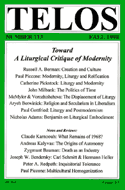 When Karl Marx described the commodity, he invoked the language of faith. For him, the commodity remained “a very strange thing, abounding in metaphysical subtleties and theological niceties.”[1] Marx, a dedicated secular economist, hesitated to pinpoint the exact power of the commodity. He could not fully understand it without recourse to a mythology he abhorred, one that far predated his radical recasting of accepted historical narratives. Here religion colors economics: the logic of exchange resembles a curious mysticism. When Karl Marx described the commodity, he invoked the language of faith. For him, the commodity remained “a very strange thing, abounding in metaphysical subtleties and theological niceties.”[1] Marx, a dedicated secular economist, hesitated to pinpoint the exact power of the commodity. He could not fully understand it without recourse to a mythology he abhorred, one that far predated his radical recasting of accepted historical narratives. Here religion colors economics: the logic of exchange resembles a curious mysticism.
Continue reading →
By Johanna K. Schenner · Wednesday, September 17, 2014 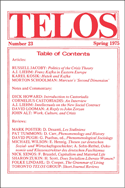 In “Franz Kafka in Eastern Europe,” Antonin J. Liehm addresses the impact of Kafka on both the communist literary sphere and the regime following the May 1963 Liblice Conference, an international symposium dealing with Kafka’s life and work. At first glance, this symposium does not appear to be remarkable: Kafka, known for such works as “The Metamorphosis” (1915) and “The Castle” (1926), was born in Prague in 1883, and he worked there as a lawyer before dying in 1924 in the sanatorium at Kierling, located in Klosterneuburg, Austria. Nonetheless, the symposium revealed that the socialist regimes were less totalitarian than supposed, if only for a short time, and it also attributed to Kafka a significant role in the beginning of cultural democratization, which then spread to other spheres. In “Franz Kafka in Eastern Europe,” Antonin J. Liehm addresses the impact of Kafka on both the communist literary sphere and the regime following the May 1963 Liblice Conference, an international symposium dealing with Kafka’s life and work. At first glance, this symposium does not appear to be remarkable: Kafka, known for such works as “The Metamorphosis” (1915) and “The Castle” (1926), was born in Prague in 1883, and he worked there as a lawyer before dying in 1924 in the sanatorium at Kierling, located in Klosterneuburg, Austria. Nonetheless, the symposium revealed that the socialist regimes were less totalitarian than supposed, if only for a short time, and it also attributed to Kafka a significant role in the beginning of cultural democratization, which then spread to other spheres.
Continue reading →
|
|
 Central to Carl Schmitt’s geophilosophy is his view that law is intrinsically linked to the physical location. This connection between the terra firma and the law is an essential element of what he refers to as nomos. Schmitt sees this as the most authentic form of law, distinguishable from views that perceive law as a normative or positive regime. In his article “Carl Schmitt and the Sacred Origins of Law,” Mika Ojakangas elucidates Schmitt’s conception of nomos, its relation to Schmitt’s view of mythopolitical legitimization of the state, and the consequences of rejecting the notion of such a link by secularization.
Central to Carl Schmitt’s geophilosophy is his view that law is intrinsically linked to the physical location. This connection between the terra firma and the law is an essential element of what he refers to as nomos. Schmitt sees this as the most authentic form of law, distinguishable from views that perceive law as a normative or positive regime. In his article “Carl Schmitt and the Sacred Origins of Law,” Mika Ojakangas elucidates Schmitt’s conception of nomos, its relation to Schmitt’s view of mythopolitical legitimization of the state, and the consequences of rejecting the notion of such a link by secularization.  Mario Tronti’s postscript to the second edition of his publication Operai e Capitale, published in Telos in 1972 as “Workers and Capital,” provides the reader with a summation of his thought on the development of the “mass worker,” presented through an analysis of notable labor struggles across the Western world. Tronti’s methodology, which he briefly explicates at the beginning of the piece, delineates certain historical workers’ struggles in order to examine “macroscopic groups of facts yet untouched by the critical consciousness of labor thought” (25). His purpose is to yield “an historical model, a privileged period of research” (25) so as to better analyze the emergence of the autonomy of the working class engaged in a dialectical struggle with capital.
Mario Tronti’s postscript to the second edition of his publication Operai e Capitale, published in Telos in 1972 as “Workers and Capital,” provides the reader with a summation of his thought on the development of the “mass worker,” presented through an analysis of notable labor struggles across the Western world. Tronti’s methodology, which he briefly explicates at the beginning of the piece, delineates certain historical workers’ struggles in order to examine “macroscopic groups of facts yet untouched by the critical consciousness of labor thought” (25). His purpose is to yield “an historical model, a privileged period of research” (25) so as to better analyze the emergence of the autonomy of the working class engaged in a dialectical struggle with capital.  This emotionally powerful and philosophically significant experience colored Popper’s views of Marxism, the call for revolutionary social change, and the utopianism that foments it. In light of this, it is not difficult to see why Popper and (in particular early) Critical Theorists might have found much about which to disagree. Robert D’Amico discusses myriad points of contrast between Karl Popper and the Frankfurt School, though from the outset he acknowledges that the “infamous ‘methodology dispute’ in German sociology that occurred primarily between Popper and Adorno . . . is best described as a misfire” (33). Despite this alleged “misfire,” D’Amico’s analysis raises profound questions that continue to gain attention and prod ongoing debate in terms of the philosophy, theory, and methodology of the social sciences.
This emotionally powerful and philosophically significant experience colored Popper’s views of Marxism, the call for revolutionary social change, and the utopianism that foments it. In light of this, it is not difficult to see why Popper and (in particular early) Critical Theorists might have found much about which to disagree. Robert D’Amico discusses myriad points of contrast between Karl Popper and the Frankfurt School, though from the outset he acknowledges that the “infamous ‘methodology dispute’ in German sociology that occurred primarily between Popper and Adorno . . . is best described as a misfire” (33). Despite this alleged “misfire,” D’Amico’s analysis raises profound questions that continue to gain attention and prod ongoing debate in terms of the philosophy, theory, and methodology of the social sciences.  Is humanity’s need to control nature ultimately working against us? Are the modern ecological crises we face today the inevitable result of the accelerating technologization of society? Can we conclude that what appears to be widespread anomie, as evidenced, for example, by the now almost monthly school shootings in the United States, and the genocidal totalitarian regimes of the twentieth century both have their “premises, dynamics, or preconditions” (169) in industrialization’s alienation of mankind from nature? In “Why Primitivism?” John Zerzan hopes to convince us that the answers to these questions are yes. Through a nuanced critique of both modernity and the thoughts of the twentieth and twenty-first centuries’ canonized intellectual Left, Zerzan draws the conclusion that we should look far back into human pre-history to find solutions to the problems that face humanity in the present. In this post, I will explore the primitivist position and provide a critique of Zerzan’s thought using Slavoj Žižek’s explorations into ecology’s ideological character.
Is humanity’s need to control nature ultimately working against us? Are the modern ecological crises we face today the inevitable result of the accelerating technologization of society? Can we conclude that what appears to be widespread anomie, as evidenced, for example, by the now almost monthly school shootings in the United States, and the genocidal totalitarian regimes of the twentieth century both have their “premises, dynamics, or preconditions” (169) in industrialization’s alienation of mankind from nature? In “Why Primitivism?” John Zerzan hopes to convince us that the answers to these questions are yes. Through a nuanced critique of both modernity and the thoughts of the twentieth and twenty-first centuries’ canonized intellectual Left, Zerzan draws the conclusion that we should look far back into human pre-history to find solutions to the problems that face humanity in the present. In this post, I will explore the primitivist position and provide a critique of Zerzan’s thought using Slavoj Žižek’s explorations into ecology’s ideological character.  When Karl Marx described the commodity, he invoked the language of faith. For him, the commodity remained “a very strange thing, abounding in metaphysical subtleties and theological niceties.”[1] Marx, a dedicated secular economist, hesitated to pinpoint the exact power of the commodity. He could not fully understand it without recourse to a mythology he abhorred, one that far predated his radical recasting of accepted historical narratives. Here religion colors economics: the logic of exchange resembles a curious mysticism.
When Karl Marx described the commodity, he invoked the language of faith. For him, the commodity remained “a very strange thing, abounding in metaphysical subtleties and theological niceties.”[1] Marx, a dedicated secular economist, hesitated to pinpoint the exact power of the commodity. He could not fully understand it without recourse to a mythology he abhorred, one that far predated his radical recasting of accepted historical narratives. Here religion colors economics: the logic of exchange resembles a curious mysticism.  In “Franz Kafka in Eastern Europe,” Antonin J. Liehm addresses the impact of Kafka on both the communist literary sphere and the regime following the May 1963 Liblice Conference, an international symposium dealing with Kafka’s life and work. At first glance, this symposium does not appear to be remarkable: Kafka, known for such works as “The Metamorphosis” (1915) and “The Castle” (1926), was born in Prague in 1883, and he worked there as a lawyer before dying in 1924 in the sanatorium at Kierling, located in Klosterneuburg, Austria. Nonetheless, the symposium revealed that the socialist regimes were less totalitarian than supposed, if only for a short time, and it also attributed to Kafka a significant role in the beginning of cultural democratization, which then spread to other spheres.
In “Franz Kafka in Eastern Europe,” Antonin J. Liehm addresses the impact of Kafka on both the communist literary sphere and the regime following the May 1963 Liblice Conference, an international symposium dealing with Kafka’s life and work. At first glance, this symposium does not appear to be remarkable: Kafka, known for such works as “The Metamorphosis” (1915) and “The Castle” (1926), was born in Prague in 1883, and he worked there as a lawyer before dying in 1924 in the sanatorium at Kierling, located in Klosterneuburg, Austria. Nonetheless, the symposium revealed that the socialist regimes were less totalitarian than supposed, if only for a short time, and it also attributed to Kafka a significant role in the beginning of cultural democratization, which then spread to other spheres. 

